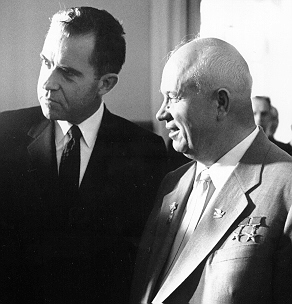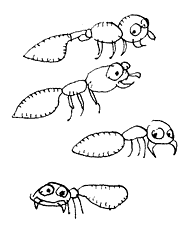Category: "Idioms"
«Я покажу тебе Кузькину мать!»
«Я покажу тебе Кузькину мать!» is a Russian idiom that is very hard to translate. It is often used as a threat. In essence it means: "I'll show you what's what!" It can also mean "to give somebody a hard time." It literally translates to: "I'll show you Kuzka's mother!", but that doesn't really make sense in English. Who the heck is Kuzka? And why are we bringing his mother into this? There have been many theories about the origin of the phrase. Some are more farfetched than others. One idea is that Kuzka was a ghost mother that lived behind stoves, and would scare away anyone that saw her. Another theory is that Kuzka was a kind of crop eating beetle that would destroy farmers' harvests, so the sight of the beetles' eggs, or "mother" would indicate that the crop was in jeopardy. There is also a theory that the phrase refers to a riding whip, called a kuzka, that a groom would keep in his boot during the wedding, signifying his dominance over his fiancee.
Whatever the origin, the phrase was popularized by former Soviet leader Nikita Khruschev. He liked using the phrase because of it's ambiguity. He enjoyed stumping his interpreters, who would often times try to translate the phrase literally, which would lead to very puzzled looks on the faces of his American counterparts. For a time in the Cold War the phrase was used as a metaphor for the Atomic Bomb. Nowadays, though, it is used more humorously, and is used to do comical impersonations of Khruschev. It is not as common anymore, but it can still be used in a threatening manner.

Photo Credit: NARA [Public domain], via Wikimedia Commons
Here are some examples:
| — Я не уверен, что вы выиграете завтра. — Мы покажем тебе Кузькину мать! |
“I don't think you'll win the game tomorrow.” “We’ll show you!” |
|
— Ты всегда будешь неудачником! — Я покажу тебе Кузькину мать! |
“You'll never be a success.” “I'll prove you wrong!” |
Вот это самое
One of the most useful words in the English language is whatchamacallit. We use it to indicate an object whose name we've forgotten. For instance, let's say you and your sister are in the kitchen and you can't remember the word collander but you need it. You could say to her “Hand me that whatchamacallit. You know, that thing to drain the pasta with.” Or you are working on your car with your brother and you can't remember “feeler gauge,” then gesturing toward the toolbox you might have this conversation:
“Which one?”
“The thing to check the spark gap.”
“Okay. Here you go.”
There are a lot of variations on that word. For instance,
Hand me that thingamajig.
Hand me that thingamajigger.
Hand me that whatchamajigger.
Hand me that whatchamabob.
Hand me that thingamabob.
Hand me that thingamabobber.
Hand me that thingamadilly.
Hand me that whoziwhatsis.
Hand me that whatsis.
The phrase that the Russians use for whatchamacallit is «вот это самое». Let's say two Russians are in the kitchen and can't remember the word дуршлаг. They might have this conversation:
| — Передай вот это самое. — Что именно? — Та штучка, чтобы слить воду с макарон. |
“Pass me that thingamabob.” “What specifically?” “That thing to drain the pasta.” |
Or two Russians are working on the car:
| — Дай-ка вот это самое. | “Pass me that thingamabob.” |
| — Что? | “What?” |
| — Вон, тот ключ. | “Over there, that tool.” |
| — Какой ключ? | “Which tool?” |
| — Эх, ты же знаешь, о чём я говорю. Чтобы гайки затянуть. | “Come on, you know what I'm talking about. To tighten the nuts.” |
| — Это называется гаечный ключ. Господи, у тебя словарный запас пятилетнего мальчика. | “It's called a wrench. Good Lord, you have the vocabulary of a five-year old.” |
| — Не преувеличивай. Просто забыл слово. | “Don't make a big deal about this. I just forgot the word.” |
Мат
Having now studied twelve languages, I can tell you with complete confidence that none has profanity as astonishing as Russian profanity. Seriously. The creativity, eloquence and vile vigor of Russian cussing is simply mind-boggling. English profanity is like baby-talk compared to Russian. The word that names the system of Russian profanity is мат. Notice that there is no soft-sign at the end of the word. Despite the superficial resemblance to the word for mother, you must never use мат around your Russian мать. She will slap your face so fast, you won't know what hit you.
| Не ругайся матом! | Don't cuss! |
| Не поверишь, но сегодня я слышал, как японец ругался чисто русским матом. А я всегда считал японцев такими вежливыми. | You won't believe it, but today I heard a Japanese man swearing like a real Russian. And I had always considered the Japanese so polite. |
| Почему на университетских занятиях не преподают мат? | Why don't they teach profanity in university classes? |
| Андрюха полнейшая свинья. Без мата не может выражаться. | Andrew is a complete pig. He can't open his mouth without cussing. |
In the US you can often hear English curse words in casual conversations on the street. In Russia there is still a wide gap between people who regularly use мат and people who don't. Those who use it, use it like crazy. Most everybody else hardly ever uses it. Not too surprisingly, factory workers and peasants are more likely to use it than highly educated folks. I was much amused to read about an ice cream factory in Barnaul where the management got so tired of the workers' vulgarity that they issued an official dictionary to help the workers translate their normal curse-laden expressions into polite literary Russian. I can tell, dear reader, that you are consumed with curiosity about this dictionary, so a bit of it is reproduced below.
Warning! The material below contains offensive Russian and English profanity!
Мурашки
 I don’t like most horror movies. There is always a naïve dummy being led into the hands of an evil master, who is driven by his utter insanity or various psychological issues. All this blood spill doesn’t do anything for me except for giving me an uneasy feeling in my stomach. Personally, I prefer suspense. I like that little chill and goose bumps you get when thinking “Can this really be possible?”
I don’t like most horror movies. There is always a naïve dummy being led into the hands of an evil master, who is driven by his utter insanity or various psychological issues. All this blood spill doesn’t do anything for me except for giving me an uneasy feeling in my stomach. Personally, I prefer suspense. I like that little chill and goose bumps you get when thinking “Can this really be possible?”
In Russian the goose bumps are called «гусиная кожа» “goose skin.” However, a more folksy word is мурашки.
The reason мурашки is used to describe this feeling is because this is also a word for ants or other little insects. Therefore, «мурашки по коже побежали», “ants ran on the skin” is probably one of the most used expressions to describe goose bumps along with the feeling causing them. (Insects running on your skin… mmmagical feeling… ![]() Gross!)
Gross!)
| Я люблю читать, сидя у большого дуба у реки. Только вот там очень много всяких мурашек и букашек бегает... | I like reading next to a big oak tree over by the river. Too bad there are a lot of ants and other bugs there… |
I am not sure what the context should be but I suppose you one could talk about a singular goose bump, мурашка, even though it is usually seen in its plural form. However, мурашка can definitely be used when talking about an ant.
Just like in English, you can get мурашки from being cold or overcome by feelings, either positive or negative.
| Когда я слушаю музыку Моцарта, у меня аж мурашки по коже! | When I listen to Mozart’s music, I get goose bumps! |
| — Тебе Коля рассказывал, как он по темноте домой вчера возвращался? — Да, страшно так, у меня муражки по коже пробежали! |
“Did Kolya tell you how he was getting home in the dark yesterday?" “Yes, so scary, I even got the goose bumps!” |
| Какая ужасная история! У меня мурашки выступили! | What a horrible story! I got goose bumps! |
| Тебе не холодно? Смотри, ты вся в мурашках! | Are you cold? Look, you are all covered in goose bumps! |
| Когда меня начальник к себе вызвал, у меня муражки по спине пробежали: думала, уволит! | When my boss called me in to see him, I got goose bumps: I thought he was going to fire me! |
Ломать/сломать & ломаться/сломаться

A little while ago I wrote about words that can have multiple meanings because of their use in Russian slang. The verb «ломать» as well as its reflexive form «ломаться» are also such words.
The main meaning of this verb is “to break”. However, someone could say меня ломает to express a feeling of withdrawal after using drugs or when being sick and running high fever. Consequently, the word for withdrawals is «ломка».
| Когда моя кошка опрокинула вазу, тюльпаны упали на пол и их стебли сломались. | When my cat knocked a vase over, the tulips fell on the floor and the stems got broken. |
| — Катя, зачем ты сломала Ленину куклу? — Потому, что она не давала мне с ней играть! |
“Katya, why did you break Lena’s doll?" “Because she wouldn’t let me play with it!” |
| На улице было очень скользко. Я упала и сломала руку! | It was very slippery outside. I fell and broke my arm. |
| — Почему Костя так себя ведёт? — Его ломает: он пытается бросить принимать наркотики. |
“Why is Kostya acting this way?” “He’s having withdrawals from trying to quit taking drugs.” |
There is also a rather well used idiom using this verb: «ломать себе голову». It means to puzzle or rack one's brains over something.
| Я ломаю себе голову, пытаясь понять, как это случилось. | I am puzzled trying to understand how it happened. |
The reflexive form, ломаться, means to quit working or functioning.
| У меня поломалась машина, можешь подвезти? | My car broke; could you give me a ride? |
However, ломаться can also mean, “crack” when referencing changes in a young’s man’s voice.
| У Васи голос уже ломается, он становится мужчиной. | Vasya’s voice is cracking; he’s becoming a man. |
Also, ломаться has two other meanings in Russian slang. The first one is to "put on airs, while the second one is to "stubbornly refuse to concede".
| Ну что ты ломаешься? Не можешь нормально говорить? | Why are you putting on airs? Can’t you speak normally? |
| Дима, тебя все упрашивают, а ты ломаешься! Ну, кто так делает? | Dima, everyone is begging you and you are stubbornly refusing! Who does that? |
Here's a video from Kira Muratova's movie. Her movies are always very unique. More often than not the main character is played by Renata Litvinova, who is the queen of putting on airs.
If you would like to see a transcript and translation of this clip, click here.